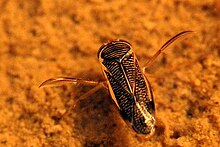Corixidae
| Corixidae | |
|---|---|

| |
| Hesperocorixa castanea | |
| Scientific classification | |
| Kingdom: | Animalia |
| Phylum: | Arthropoda |
| Class: | Insecta |
| Order: | Hemiptera |
| Infraorder: | Nepomorpha |
| Family: | Corixidae Leach, 1815 |
| Subfamilies, Genera | |
|
33 genera in 6 subfamilies | |
Corixidae is a family of aquatic insects in the order Hemiptera. They are found worldwide in virtually any freshwater habitat and a few species live in saline water.[1] There are about 500 known species worldwide, in 33 genera, including the genus Sigara.
Members of the Corixidae are known in the United States as water boatmen, a term that is sometimes used in the United Kingdom for Notonecta glauca, an insect of a different family, Notonectidae, and Corixa punctata is the "lesser water boatman".[2]
Morphology and ecology[]
Corixidae generally have a long flattened body ranging from 2.5 to 15 mm (0.1–0.6 in) long.[1] Many have extremely fine dark brown or black striations marking the wings. They tend to have four long rear legs and two short front ones. The forelegs are covered with hairs and shaped like oars, hence the name "water boatman". Their four hindmost legs have scoop- or oar-shaped tarsi to aid swimming.[3] They also have a triangular head with short, triangular mouthparts. Corixidae dwell in slow rivers and ponds, as well as some household pools.

Unlike their relatives the backswimmers (Notonectidae), who swim upside down, Corixidae swim right side up. It is easy to tell the two types of insects apart simply by looking at the swimming position.[1]
Corixidae are unusual among the aquatic Hemiptera in that they are mostly non-predatory, feeding on aquatic plants and algae instead of insects and other small animals. They use their straw-like mouthparts to inject enzymes into plants. The enzymes digest the plant material, letting the insect suck the liquified food back through its mouthparts and into its digestive tract. A few species will eat small invertebrates such as larvae of Nematocera, but the family is primarily herbivorous.[1]
Some species within this family are preyed upon by a number of amphibians including the rough-skinned newt (Taricha granulosa).[4]
The reproductive cycle of Corixidae is annual. Eggs are typically oviposited (deposited) on submerged plants, sticks, or rocks. In substrate limited waters (waters without many submerged oviposition sites), every bit of available substrate will be covered in eggs.

Genera[]
These 55 genera belong to the family Corixidae:
- Bode, 1953 g
- Kirkaldy, 1898 g
- Popov, 1968 g
- Arctocorisa Wallengren, 1894 i c g b
- Popov, 1988 g
- Popov, 1986 g
- Callicorixa White, 1873 i c g b
- Cenocorixa Hungerford, 1948 i c g b
- Lundblad, 1928 i c g
- Corisella Lundblad, 1928 i c g b
- Corixa Geoffroy, 1762 i c g
- Popov, 1986 g
- Popov, 1986 g
- Hong & Wang, 1990 g
- Popov, 1986 g
- Cymatia Flor, 1860 i c g b
- Dasycorixa Hungerford, 1948 i c g b
- Popov, 1971 g
- Popov, 1966 g
- c g
- Lundblad, 1928 g
- Popov, 1971 g
- Glaenocorisa Thomson, 1869 i c g b
- Graptocorixa Hungerford, 1930 i c g b
- Popov, 1988 g
- Lundblad, 1928 g
- Hesperocorixa Kirkaldy, 1908 i c g b
- Popov, Dolling & Whalley, 1994 g
- Lin, 1980 g
- Lin, 1977 g
- Hong & Wang, 1990 g
- Popov, 1971 g
- Micronecta Kirkaldy, 1897 g b
- Jaczewski, 1931 i c g
- Hungerford, 1925 i c g
- Lundblad, 1928 g
- Abbott, 1912 i c g
- b
- Paracorixa Stichel, 1955 g
- Poisson, 1957 g
- Jaczewski, 1931 i c g
- Ramphocorixa Abbott, 1912 i c g b
- Lin, 1980 g
- Popov, 1988 g
- Lin, 1980 g
- Sigara Fabricius, 1775 i c g b
- Popov, 1971 g
- Synaptonecta Lundblad, 1933 i c g b
- Bergroth, 1899 i c g
- Trichocorixa Kirkaldy, 1908 i c g b
- Popov, 1986 g
- Lin Qibin, 1986 g
- Lin, 1980 g
- Hungerford, 1947 g
- Hong, 1983 g
Data sources: i = ITIS,[5] c = Catalogue of Life,[6] g = GBIF,[7] b = Bugguide.net[8]
References[]
- ^ Jump up to: a b c d Randall T. Schuh; James Alexander Slater (1996). True Bugs of the World (Hemiptera:Heteroptera): Classification and Natural History (2 ed.). Cornell University Press. pp. 119–122. ISBN 978-0801420665.
- ^ BBC Science and Nature: Water boatman, common backswimmer Notonecta glauca Retrieved on 2008-07-26
- ^ Missouri Department of Conservation: Water boatmen Retrieved on 2016-08-08
- ^ C. Michael Hogan (2008) Rough-skinned Newt (Taricha granulosa), Globaltwitcher, ed. Nicklas Stromberg Archived 2009-05-27 at the Wayback Machine
- ^ "Corixidae Report". Integrated Taxonomic Information System. Retrieved 2018-04-20.
- ^ "Browse Corixidae". Catalogue of Life. Retrieved 2018-04-20.
- ^ "Corixidae". GBIF. Retrieved 2018-04-20.
- ^ "Corixidae Family Information". BugGuide.net. Retrieved 2018-04-20.
External links[]
| Wikimedia Commons has media related to Corixidae. |
| Wikispecies has information related to Corixidae. |
- Corixidae
- Nepomorpha
- Heteroptera families